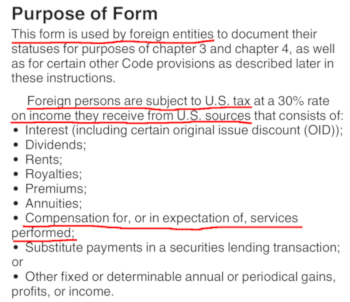I just came across some US tax forms for foreign entities like W-8BEN-E and 1040NR which made me ask this question.
Suppose a company called Cool Stuff Ltd. runs some sort of online business serving customers all over the world. This could be paid content subscriptions, dating, posting ads/classifieds, hosting, VPN — all sorts of stuff that is performed by software accessible by customers over the Internet.
The company is not present in the US in any way: no incorporation, no offices, no employees, no web hosting, the shareholders and directors are not related to the US at all.
People in the US can access the company's website/app and buy services in the company's home country currency. The company may not even care or take note of where they are from.
Technically, if any single John Doe from the US decides to buy a subscription, he will make the company "receive" "income" "from U.S. sources that consists of" "Compensation for, or in expectation of, services performed" (W-8BEN-E):
Does that really trigger the company's obligation to fill US tax forms and pay tax in the US? If so, is there any threshold i.e. minimum income that triggers the obligation?
